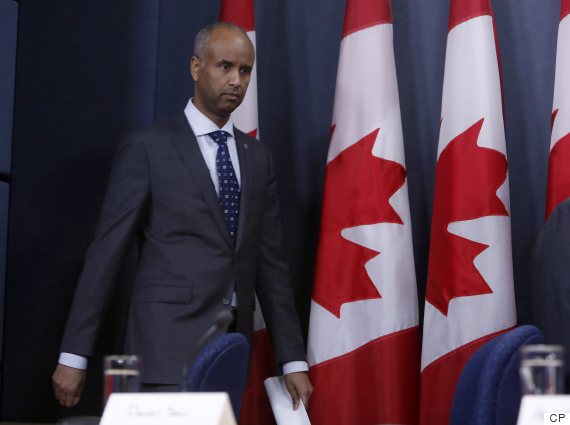The U.S. president said Thursday that his commerce secretary will be involved in negotiations, that he'll move as quickly as possible under legal guidelines and that he's not sure what form a new NAFTA will take.
He suggested the agreement could get a facelift — or an entirely new body.

U.S. President Donald Trump attends the National Prayer Breakfast in Washington, D.C., Feb. 2, 2017 (Photo: Carlos Barria/Reuters)
"I don't care if it's a renovation of NAFTA or a brand new NAFTA," Trump said. "But we do have to make it fair."
He added, in jest: "Maybe we do a new NAFTA and we add an extra, 'F' ... for 'free and fair' trade."
The remarks suggest the president hasn't reached a decision on how extensive he'd like the changes to be — or even what the final format of the agreement might look like.
Some trade experts predict the trilateral agreement of 1993 could wind up splintering into separate one-on-one deals between the countries — the approach favoured by one of Trump's closest allies in Congress, lawmaker Chris Collins.
The Canadian government appears open to both possibilities — officials have signalled publicly, and privately, that while they prefer the format as it is, they could live with multiple agreements as a Plan B.
'It'll be quite something'
That's exactly what one leading authority on NAFTA predicted will happen.
The current political trendlines point toward separate bilateral agreements, said Gary Hufbauer, the former U.S. trade official and NAFTA expert who's currently an analyst with Washington's Peterson Institute for International Economics.
It's not the best approach — but it might be the one that's adopted, Hufbauer said.
He said the new administration has repeatedly said it prefers bilateral deals to trilateral ones. Also, bashing NAFTA is popular in both U.S. parties. So it stands to reason that Trump might try replacing it, he said.
"I'm just tracing the logic of their various statements," Hufbauer said.
"It sounds like the logical outcome for NAFTA is to get rid of the name, and have a bilateral agreement with Canada and another bilateral agreement with Mexico.... With Canada it's easier because you could build on the foundation of the Canada-U.S. Free Trade Agreement. With Mexico you'd kind of be starting from scratch."
Bilateral deals would be more complicated, more time-consuming, suck up additional energy from lawmakers, negotiators, and industry lobbyists, and run the risk of disrupting supply chains for products made in multiple countries, he added.
"It'll be quite something."

Trump said he'll move as quickly as possible under legal guidelines and that he's not sure what form a new NAFTA will take. (Photo: Reuters)
Trump also said his choice for commerce secretary, billionaire businessman Wilbur Ross, will be involved in negotiations, even though trade talks are usually led by the United States Trade Representative.
That news could relieve some people in Ottawa. Ross is not considered among the most hawkish anti-trade members among Trump's team.
"(He will be) representing us in negotiations," Trump said, with Ross in the room. "Wilbur is fair, he will be fair to other countries."
Nonetheless, Ross — a billionaire best known for investing in struggling U.S. manufacturing businesses, stripping them down, and saving them from shuttering or offshoring — has said he won't go easy on trading partners.
"I don't intend to be pushed around by anyone," Ross told his Senate confirmation hearing.
He appeared to express satisfaction that the Mexican peso and Canadian dollar had declined since Trump's nomination — telling senators this proved that international markets were prepared for serious negotiations.
"I don't care if it's a renovation of NAFTA or a brand new NAFTA."
"When you start out with the adverse party understanding that he or she is going to have to make concessions, that's a pretty good background for any negotiation to begin," Ross said.
Canada has signalled some of its priorities for a new NAFTA: a permanent agreement on softwood lumber that would end the recurring cycle of once-a-decade trade wars, some expansion of protections from Buy American procurement restrictions, and greater rights for labour mobility.
It might not be easy.
One lawmaker asked Ross at his hearing whether he could eliminate Buy American exemptions in NAFTA, not expand them. He did not commit an answer. The U.S. government has said almost nothing about its intended priorities.
The U.S. government is expected to begin gathering input from industries when it formally launches the negotiation process.
-- This feed and its contents are the property of The Huffington Post, and use is subject to our terms. It may be used for personal consumption, but may not be distributed on a website.




 A massive protest against President Trump's travel ban outside of the U.S. Consulate in downtown Toronto on Jan. 30. (Getty)
A massive protest against President Trump's travel ban outside of the U.S. Consulate in downtown Toronto on Jan. 30. (Getty)





 France's President Francois Hollande gives a press conference during an European Union summit on Friday in Valletta, Malta. (Photo: AFP/Getty Images)
France's President Francois Hollande gives a press conference during an European Union summit on Friday in Valletta, Malta. (Photo: AFP/Getty Images) French police secure the site near the Louvre Pyramid in Paris on Friday. (Photo: Reuters)
French police secure the site near the Louvre Pyramid in Paris on Friday. (Photo: Reuters) A police officer stands guard near the Louvre museum on February 3, 2017 in Paris, after a soldier patrolling at the museum shot and seriously injured a machete-wielding man. (Photo: Alain Jocard/AFP via Getty Images)
A police officer stands guard near the Louvre museum on February 3, 2017 in Paris, after a soldier patrolling at the museum shot and seriously injured a machete-wielding man. (Photo: Alain Jocard/AFP via Getty Images) French police secure the site near the Louvre Pyramid. (Photo: Christian Hartmann/Reuters)
French police secure the site near the Louvre Pyramid. (Photo: Christian Hartmann/Reuters)



 Tanya Tagaq performs songs from her new album at a private event at the Fehely Fine Art gallery in Toronto, May 20, 2014. (Photo: J.P. Moczulski/CP)
Tanya Tagaq performs songs from her new album at a private event at the Fehely Fine Art gallery in Toronto, May 20, 2014. (Photo: J.P. Moczulski/CP) Tanya Tagaq performs on stage during the second day of Womad Festival July 24, 2010 in Wiltshire, England. (Photo: Getty Images)
Tanya Tagaq performs on stage during the second day of Womad Festival July 24, 2010 in Wiltshire, England. (Photo: Getty Images)



